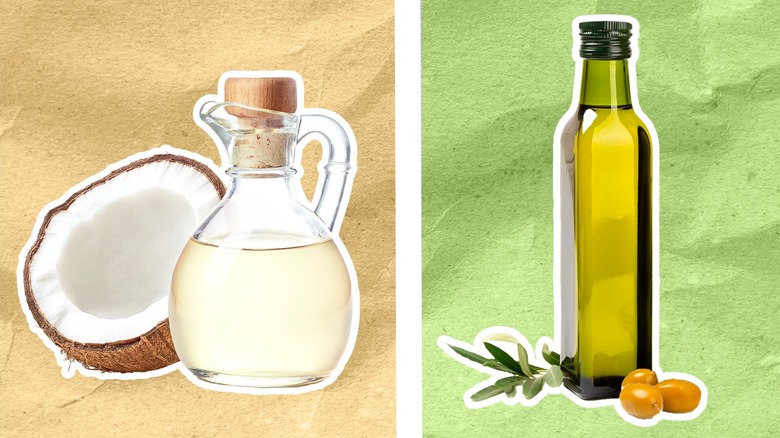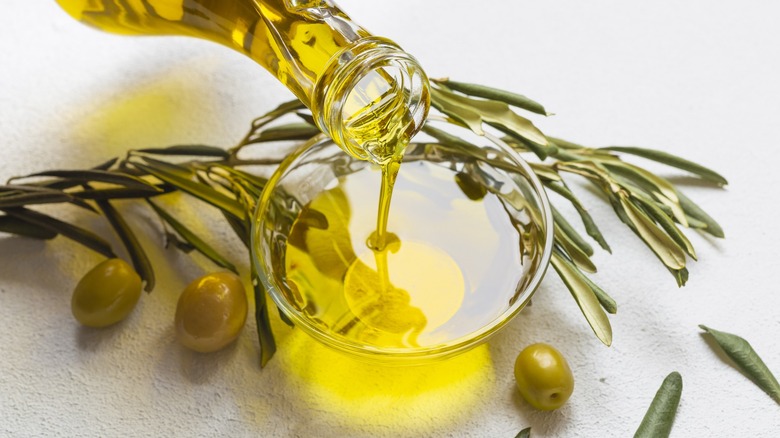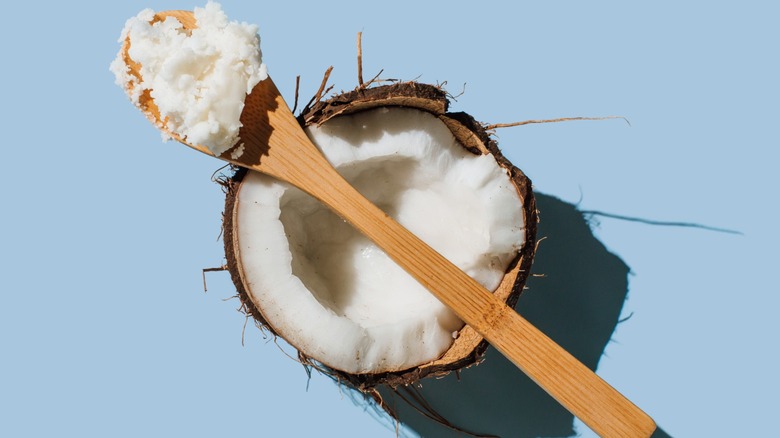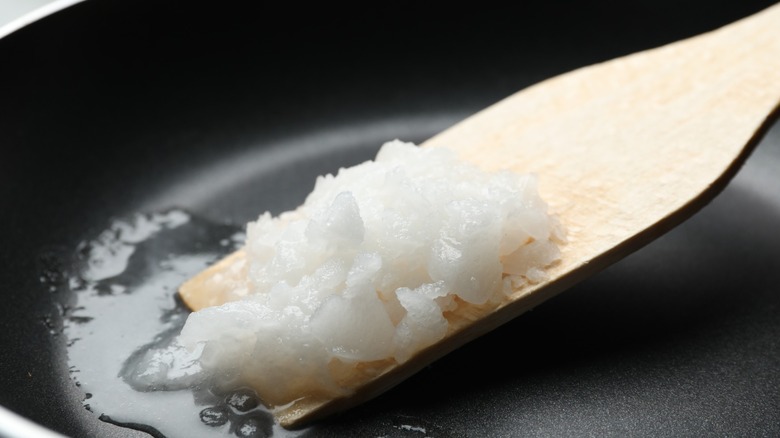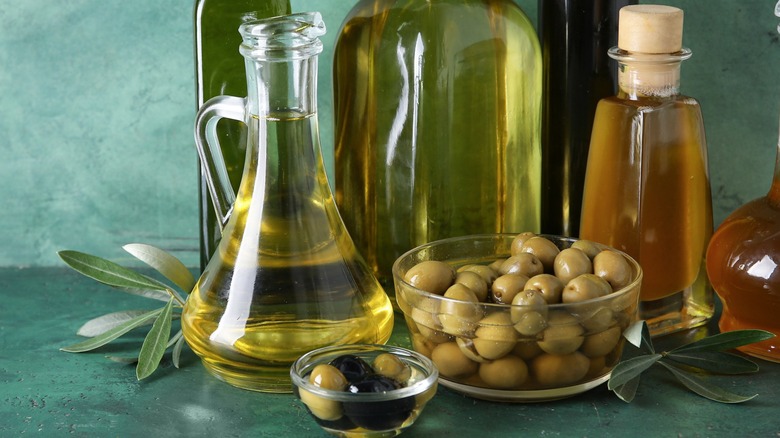Coconut Oil Vs Olive Oil: The Nutritional Difference, Explained
We may receive a commission on purchases made from links.
There are few topics in food as maddening as parsing the health and nutritional differences between cooking fats like olive oil and coconut oil. You'll look up recommendations and try to make a decision, then trends change, science makes new discoveries, and suddenly that "healthy" fat you were eating is actually considered the worst thing you can possibly choose. In fact, for many years in the 20th century, fat itself was a bad word and consumers were trying to cut it out completely, only for those concerns to come under fire for being overly simplistic and possibly contributing to growing obesity.
At one point, vegetable oil or vegetable oil substitutes and seed oils were considered healthy, now everyone is telling you to avoid them. So, any questions over the nutrition of cooking fats comes back to the starting point: It's complicated. The reality is that almost any cooking fat, coconut oil and olive oil included, have their upsides and their downsides. On the surface, coconut and olive oil aren't that different. They have similar levels of fat and almost identical calorie counts.
But get under the surface and there are some meaningful divergences in the smaller details. Both can still be part of a nutritious diet, potentially raise levels of good cholesterol, and have anti-inflammatory and antioxidant properties. There is no reason to run away from either completely — coconut oil and olive oil can both have a place in your pantry, but each has some small nutritional advantages over the other.
What is olive oil?
Olive oil is liquid fat derived from olive fruits, which is pressed out of olives in a variety of ways. It's the principal cooking fat of the Mediterranean region, where the olive tree originated, and most olive oil is still produced there today. The majority of olive oil brands come in a variety of basic grades, being labeled virgin, extra virgin, or just olive oil if it is more refined. Olive oil has become incredibly popular around the world for both its flavor and potential health benefits, and it gets used for cooking and sauteing, as well as a condiment for dipping or drizzling. Olive oil is associated with benefits like helping to lower the risk of heart disease and strokes. It also contains antioxidants.
It's particularly favored for its association with the high-ranked Mediterranean diet, which is recommended by many nutritionists and organizations for its links to heart health. In the past, studies have shown that the number of deaths from heart disease in the Mediterranean region is significantly lower than it is in the United States. While the benefits of the Mediterranean diet are linked to many aspects of the culture, including the consumption of fresh fruits and vegetables and whole grains, olive oil being the primary cooking fat of the region is also considered a major factor in its positive health outcomes.
What is coconut oil?
Coconut oil is extracted from the meaty flesh of coconuts. Dried coconut flesh, called copra, is as much as 70% fat, which is pressed out to produce coconut oil. Unlike many other cooking oils, coconut oil is solid or semi-solid at room temperature, similar to margarine, which is the result of its high levels of saturated fat. Coconut palms originated in Southeast Asia, and oil from the fruits is still a major cooking ingredient in the region. Coconut oil has a lot of different kitchen applications, and it can be used in desserts and baking in place of butter, which makes it a popular ingredient for vegan bakers. It also has a high smoke point that's good for frying and sauteing. While it can have a coconut flavor, there are refined versions that are more neutral in taste, like this one by Vitacost on Amazon.
Coconut oil has seen big swings in nutritional reputation over recent decades. Back in the '90s it was attacked for its high levels of saturated fat. But it has made a comeback in the last decade as consumers realized that those problems were less of an issue with unrefined coconut oil, like this one by Viva Naturals on Amazon, and research has found that it's a good source of antioxidants, and that the lauric acid it contains may not be as bad as other saturated fats. However, coconut oil has also become a popular fad health ingredient and there are many claims about its benefits, including its ability to lower blood pressure and even combat Alzheimer's disease, that are completely or mostly unproven.
Both coconut oil and olive oil are more nutritious when unrefined
Like many cooking oils, coconut and olive oil come in a variety of styles that vary in how processed they are. They are generally split between categories of unrefined and refined, with the refined versions of these cooking oils containing fewer nutrients and health benefits than the unrefined versions. Refining both olive oil and coconut oil involves processes like heating and bleaching to remove impurities and bacteria. Extra virgin or virgin olive should be unrefined, while anything just labeled "olive oil" is usually refined or a blend. The same goes for refined and unrefined coconut oil, although virgin coconut oil is not a label that is legally regulated the way extra virgin olive oil is.
Refining cooking oils has effects like making them more neutral in flavor and giving them a higher smoke point, which can be beneficial, but the process also removes natural compounds with health benefits. Both coconut and olive oil that has been refined lose some of their beneficial antioxidants, and refined olive oil can also have fewer of the good fats and reduced nutrition that we associate with extra virgin olive oil. Refining also destroys other beneficial compounds that have positive anti-inflammatory properties, and the few vitamins that cooking oils have. While refined oils have plenty of uses in the kitchen, this makes them less nutritious than more natural virgin versions of the same oils.
Coconut oil contains more saturated fat
Being cooking fats, the biggest distinction between coconut oil and olive oil is the kinds of fat they contain. Coconut oil is between 80% and 90% saturated fat, and while there is varying evidence on the effects of saturated fat, most studies and doctors agree that consuming too much can lead to increases in harmful cholesterol levels and cardiovascular disease. Some claims defending coconut oil say that cultures and cuisines that use it, like Filipino dishes and Polynesian culture, have low rates of heart disease.
But those claims are hard to separate from other parts of the local plant-heavy diet and active lifestyles that are very heart healthy. There is also the claim that the fat in coconut oil is primarily lauric acid, which is a better form of saturated fat. However, lauric acid is still processed by the body like a less desirable long-chain fatty acid, and most of the other fats in coconut oil are also the long-chain variety associated with high cholesterol.
Olive oil, meanwhile, contains 98% or more monounsaturated fatty acids, which are actually associated with improving cholesterol levels. The primary fat in olives is oleic acid, and it is considered to have health benefits beyond just better cholesterol. It has also been shown to possibly reduce the risk of type 2 diabetes. The remaining fats in olive oil include polyphenols, which are thought to have anti-inflammatory properties and slow the development of chronic diseases like heart disease and even cancer.
Both offer only a small amount of nutrients
While olive oil and coconut oil do have some measurable nutritional benefits, neither is a major source of nutrients beyond their fat. Even extra virgin olive oil, like this one by Atlas Olive Oils on Amazon, does not contain many vitamins, although it does have some meaningful amounts of vitamins E and K, providing around 10% of your daily value of both per tablespoon. Coconut oil has even less, containing only a small amount of nutrients beyond its fats and acids. So, while the two oils' varying effects on heart health are a serious consideration, olive oil's higher nutritional profile beyond that is only slightly better.
And if you are watching your calorie count, coconut oil and olive oil are virtually identical, with a tablespoon-sized serving of each containing 121 calories for coconut, and 119 calories for extra virgin olive oil. While both oils are calorically dense given their serving size, calories themselves are not a problem when the ingredient is as nutritionally beneficial as extra virgin olive oil, and high-calorie oils also help you feel more full for longer. However, like any calorie-dense food, you can consume too much olive oil and coconut oil, with coconut especially being best used in moderation. And as always, remember that any nutritional benefits associated with any one ingredient can be minor, and the positives are usually tied to a more fully balanced diet.
